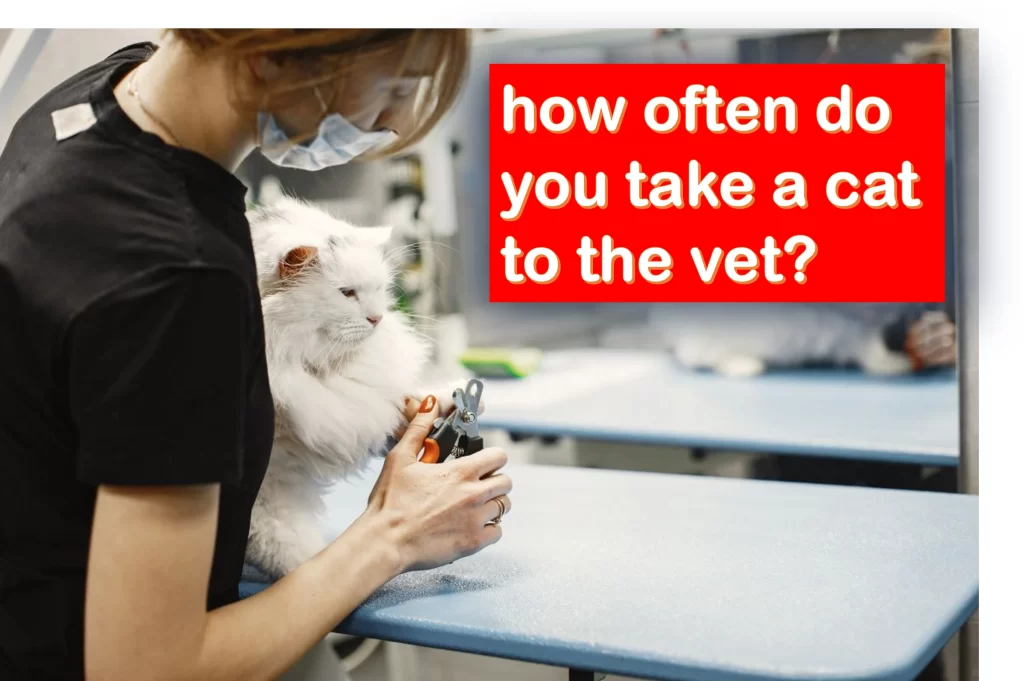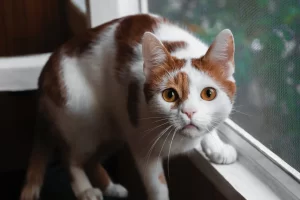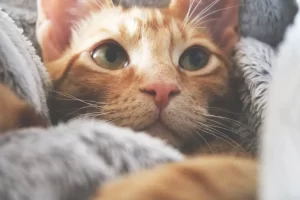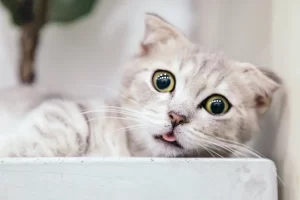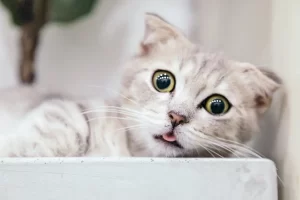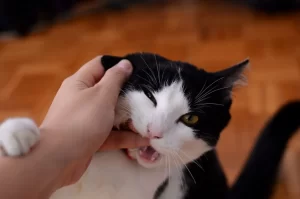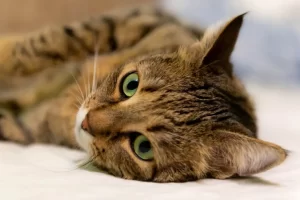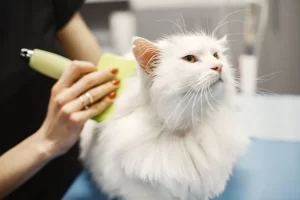As a cat owner, it’s important to understand the importance of regular vet visits for your feline companion. Regular check-ups and preventative care can help detect and prevent potential health issues, and ensure your cat is happy and healthy throughout their life. However, many cat owners may be unsure of how often they should take their cat to the vet. In this article, we will discuss the recommended frequency of vet visits, the importance of regular check-ups and preventative care, and factors that may influence how often a cat should visit the vet. We will also discuss the role of vaccinations, monitoring a cat’s weight, and the importance of dental care, parasite control, and blood work in keeping your cat healthy.
Related articles:
how often should I take my dog to the Vet?
Table of Contents
ToggleFrequency of cat vet visits for routine care
The general recommendation for how frequently a cat should visit the vet for routine check-ups and preventative care is at least once a year. This annual visit is an important opportunity for the vet to assess your cat’s overall health and well-being, and to identify any potential health issues that may need to be addressed. During this visit, the vet will perform a physical examination, checking the cat’s eyes, ears, nose, teeth, and gums, as well as their coat, skin, and weight. The vet will also check the cat’s vital signs, such as heart rate, breathing, and temperature, to ensure that they are within normal ranges. The vet will also discuss any concerns or issues the owner may have regarding their cat’s behavior, eating habits, or overall health.
In addition to the physical examination, the vet may also administer any necessary vaccinations to protect your cat from serious diseases such as rabies, feline leukemia, and feline infectious peritonitis. The vet may also discuss any preventative care measures such as parasite control to protect your cat from fleas, ticks and other parasites. They may also perform blood work or diagnostic tests to check for any underlying health issues. Dental cleaning is also important, as it can help prevent tooth decay, tooth abscesses, gum disease and other dental problems that can affect your cat’s overall health.
It is important to note that younger cats may require more frequent visits, as they may need to have their vaccinations updated more often, whereas older cats may require more frequent visits for monitoring their health as they age. If your cat has a chronic illness or other special health needs, your vet may recommend more frequent visits to keep your cat healthy and comfortable. With proper care and regular vet visits, your cat can live a long, healthy life.
The importance of regular check-ups for detecting and preventing health issues
Regular check-ups are important for detecting and preventing health issues in cats. During these visits, the vet will perform a physical examination and check for any signs of potential health problems. This includes checking the cat’s weight, vital signs, and overall appearance, as well as listening to their heart and lungs. The vet may also perform diagnostic tests such as blood work to check for underlying health issues.
Regular check-ups also allow the vet to keep track of the cat’s overall health and well-being over time. This makes it easier to detect any changes or abnormalities early on, when they are more likely to be treatable. For example, regular check-ups can help detect chronic health conditions such as diabetes or kidney disease, as well as more acute conditions such as infections or injuries.
Regular check-ups also allow the vet to provide preventative care, such as vaccinations and parasite control, which can help protect your cat from serious diseases. In addition, the vet can give you advice on how to keep your cat healthy, such as recommending a healthy diet and exercise routine, or providing information on dental care.
Overall, regular check-ups are crucial for detecting and preventing health issues in cats, and for keeping your cat happy and healthy throughout their life. Regular check-ups also allows the veterinarian to establish a relationship with the cat and the owner, this helps to detect any subtle changes in the cat behavior and overall health, and can help detect illnesses early on.
Factors influencing cat vet visit frequency
There are several factors that may influence how often a cat should visit the vet. These include:
- Age: Younger cats may require more frequent visits to the vet for vaccinations and other preventative care measures. Kittens typically need to visit the vet more often than adult cats, as they may need multiple rounds of vaccinations to ensure they are protected from serious diseases. On the other hand, older cats may require more frequent visits for monitoring their health as they age, as they are more prone to certain age-related health issues.
- Breed: Certain breeds of cats may be more prone to certain health issues, and may require more frequent vet visits as a result. For example, certain breeds of cats may be more prone to dental problems and may need more frequent dental check-ups.
- Overall health: Cats with underlying health conditions or chronic illnesses may require more frequent visits to the vet for monitoring and treatment. Cats that are overweight or obese may also require more frequent visits, as they are at a higher risk of certain health issues such as diabetes and heart disease.
- Lifestyle: if your cat has an indoor or outdoor lifestyle, or if they have a high-stress environment may also influence how often they should visit the vet. Outdoor cats may have a higher risk of being exposed to parasites or diseases and may require more frequent visits for check-ups and preventative care.
- Vaccination status: If your cat is up to date with their vaccinations or not, this will also influence how often they should visit the vet. Cats that are up to date with their vaccinations may only need to visit the vet once a year, while cats that are not up to date may require more frequent visits until their vaccinations are caught up.
It’s important to consult with your veterinarian to determine the appropriate schedule of visits for your cat, based on their age, breed, overall health, lifestyle and vaccination status. Your veterinarian will be able to give you personalized recommendations on how often your cat should visit the vet.
The cost of regular vet visits
The cost of regular vet visits can vary greatly depending on a number of factors, such as the location of the clinic, the services provided, and the overall health of the cat. It’s difficult to provide specific numbers without knowing more about your location and the services you’ll be seeking but to give you an idea:
- A routine check-up and preventative care, such as vaccinations, can cost anywhere from $50 to $200, depending on the location and the services provided.
- A diagnostic test, such as bloodwork or x-rays, can cost anywhere from $100 to $500, depending on the complexity of the test.
- Treatment for illnesses or injuries can also vary greatly in cost, depending on the severity of the condition and the type of treatment required. For example, a simple infection may be treated with antibiotics and cost around $100, while a more complex condition, such as cancer, can cost thousands of dollars.
- Preventative care such as flea control, deworming, etc. can cost around $50 to $100 per visit.
It’s important to note that these numbers are approximate and should be used only as a general guide. The best way to get an accurate estimate of the cost of regular vet visits for your cat is to consult with a veterinarian in your area. Many pet insurance companies also cover regular vet visits, check with them to know what they cover.
It’s important to keep in mind that regular vet visits are a worthwhile investment in the long-term health and well-being of your cat. The cost of regular vet visits may seem high, but it can be more cost-effective in the long run to detect and prevent health issues early on, rather than waiting until a problem becomes more serious.
Importance of monitoring cat’s weight and behavior
Monitoring a cat’s weight and any changes in its physical appearance or behavior is an important aspect of its overall health and well-being. Cats, like people, can gain or lose weight for various reasons, and changes in weight can indicate underlying health issues. For example, a sudden weight loss can indicate an underlying disease such as diabetes or cancer, while a sudden weight gain can indicate an overactive thyroid or other metabolic disorder.
It’s important to regularly weigh your cat and monitor any changes in its weight. Ideally, this should be done at least once a month, and more often if you notice any changes in their weight or behavior. Your vet can help you determine a healthy weight range for your cat and provide guidance on how to achieve and maintain a healthy weight.
In addition to monitoring weight, it’s also important to pay attention to any changes in your cat’s physical appearance or behavior. For example, changes in coat quality, such as excessive shedding or dullness, can indicate a nutritional deficiency or a thyroid disorder. Changes in behavior, such as lethargy or restlessness, can also indicate underlying health issues.
Regular vet visits are an important opportunity to monitor your cat’s weight and physical appearance and address any concerns. Your vet will be able to examine your cat and provide guidance on how to maintain their health and well-being. It’s also a good idea to take pictures of your cat every month to monitor any changes.
Frequency of cat dental care and vet visits
Dental care is an important aspect of a cat’s overall health and well-being. Just like with humans, regular dental care can help prevent a variety of oral health issues, such as tooth decay, gum disease, and bad breath. Cats can also develop tartar, plaque, and calculus that can cause painful infections and tooth loss.
The general recommendation for how often a cat should have teeth cleaning is once a year. However, this can vary depending on the individual cat and their oral health. Cats with a history of dental issues or those who are prone to tartar buildup may need more frequent cleanings. Your vet will be able to examine your cat’s teeth and provide guidance on how often they should have their teeth cleaned.
It’s also important to note that regular at-home dental care is also important for your cat’s oral health. This includes regular tooth brushing, providing dental chews and toys, and feeding a diet that is formulated to promote oral health.
Regular vet visits are also an important opportunity to check your cat’s teeth and gums. Your vet will be able to examine your cat’s teeth and gums, check for any signs of dental issues, and provide guidance on how to maintain their oral health.
Importance of regular blood work and diagnostics in older cats
Regular blood work and diagnostic tests are important aspects of maintaining the health of older cats. As cats age, they are more susceptible to certain diseases and health issues, such as kidney disease, diabetes, and cancer. By performing regular blood work and diagnostic tests, it is possible to detect any early signs of these diseases and take action to prevent or treat them.
The general recommendation for how often older cats should have blood work and diagnostic tests is once a year. However, this can vary depending on the individual cat and their overall health. Cats with a history of certain diseases or those who are showing signs of illness may need more frequent testing. Your vet will be able to examine your cat and provide guidance on how often they should have blood work and diagnostic tests.
Regular blood work and diagnostic tests can help detect a variety of diseases and health issues in older cats. For example, blood work can help detect early signs of kidney disease, diabetes, and anemia. Diagnostic tests, such as urinalysis and fecal exams, can help detect infections, parasites, and other issues.
It’s also important to note that regular blood work and diagnostic tests are not only for detecting diseases but also for monitoring the effectiveness of any treatment or medication your cat might be on.
Cat vaccinations: types and schedules
The required vaccinations for cats vary depending on the specific area and laws, however, the core vaccinations that are typically recommended for cats include:
- Feline Panleukopenia (FPV): This vaccine protects against feline distemper, which is a highly contagious and potentially fatal disease. The vaccine is typically given as a series of two shots, with boosters given every 1-3 years.
- Feline Calicivirus (FCV): This vaccine protects against feline calicivirus, which is a highly contagious virus that can cause respiratory and oral infections. The vaccine is typically given as a series of two shots, with boosters given every 1-3 years. In addition to the vaccine, these natural remedies may also be helpful when dealing with the calicivirus.
- Feline Rhinotracheitis (FVR): This vaccine protects against feline herpesvirus, which is another highly contagious virus that can cause respiratory infections. The vaccine is typically given as a series of two shots, with boosters given every 1-3 years (Read more about feline herpes and useful home treatments).
- Feline Leukemia (FeLV): This vaccine protects against feline leukemia, which is a viral disease that can cause cancer and other serious health issues. The vaccine is typically given as a series of two shots, with boosters given every 1-3 years.
It is important to note that not all cats require all these vaccinations, it depends on the cat’s lifestyle and the risk they might be exposed to the different diseases. Your vet will be able to evaluate your cat’s specific needs and recommend a vaccination schedule that is right for them.
Signs of urgent vet visits for cats
There are several signs that indicate a cat needs to visit the vet immediately, including:
- Difficulty breathing: If a cat is having trouble breathing, it could be a sign of a serious condition such as asthma, pneumonia, or heart disease. You may want to check out home remedies for cat asthma if your cat has asthma.
- Persistent vomiting or diarrhea: Repeated vomiting or diarrhea can indicate a serious intestinal problem or infection.
- Loss of appetite: If a cat stops eating or drinking, it could be a sign of a serious illness or dental problem.
- Seizures: Seizures are a sign of a serious neurological problem and require immediate veterinary attention. When they are mild, home remedies might be a possible alternative treatment solution.
- Sudden lameness or pain: If a cat is limping or holding a limb up, it could be a sign of a broken bone, joint injury or an infection.
- Discharge from the eyes, nose, or mouth: This can indicate an infection or a more serious problem and requires immediate attention.
- Swelling or lumps: Swelling or lumps on the body can indicate cancer or other serious health issues. Learn more about hot to help a cat suffering from cancer here.
- Lethargy or depression: If a cat is not acting like its normal self and is lethargic or depressed, it could be a sign of a serious health issue. If your cat is lethargic, try these home treatments to boost its energy and activity levels.
- Urination problems: If a cat is straining to urinate or is producing very little urine, it could indicate a urinary tract obstruction or infection, which is a life-threatening emergency.
- Trauma: If a cat has been in a fight or has been hit by a car, it requires immediate medical attention.
If you notice any of these signs in your cat, it is important to take them to the vet as soon as possible. These are serious symptoms that can indicate a serious illness or injury and require prompt medical attention.
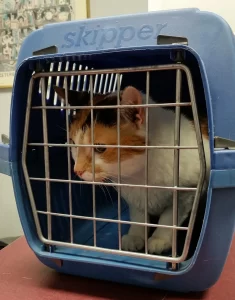
How can owners prepare for a vet visit?
Owners can prepare for a vet visit by taking the following steps:
- Gather important information: Collect information about your cat’s health history, including any previous illnesses, surgeries, and vaccinations. It is also useful to bring a list of any medications or supplements your cat is currently taking.
- Schedule an appointment: Schedule an appointment with your vet in advance to ensure that you can get the time and date that works best for you and your cat.
- Keep your cat contained: If your cat is not used to being in a carrier, it’s a good idea to prepare them in advance by leaving the carrier open in the house for a few days before the appointment so they can get used to it.
- Make sure your cat is restrained: Bring a leash or harness to keep your cat in control during the visit.
- Bring your cat’s food and water: Bring your cat’s food and water with you to the appointment, in case your cat becomes anxious and refuses to eat or drink.
- Keep your cat calm: Try to keep your cat as calm as possible before and during the visit. Cats can sense their owners’ anxiety, which can make them anxious as well.
- Be prepared to answer questions: Your vet will likely ask you several questions about your cat’s health and behavior. Be prepared to answer them to the best of your ability.
- Bring any relevant diagnostic test results or samples: If your cat has previously been diagnosed with a condition or if you suspect a specific issue, bring any relevant diagnostic test results or samples, such as a fecal sample, to the appointment.
By following these steps, you can ensure that the visit is as smooth and stress-free as possible for both you and your cat.
How can owners ensure their cat is comfortable during vet visits?
Owners can take several steps to ensure that their cat is comfortable during vet visits:
- Use a comfortable carrier: A well-ventilated, spacious carrier will make the journey to and from the vet less stressful for your cat.
- Provide familiar items: Bring along familiar items such as a blanket or toy to provide a sense of security and comfort for your cat.
- Keep the carrier covered: Covering the carrier with a blanket or towel can help to reduce the amount of visual stimulation and create a sense of security.
- Use pheromone sprays or diffusers: Pheromones can help to reduce stress and anxiety in cats. Consider using a pheromone spray or diffuser in the carrier or in the exam room.
- Keep the visit short: If possible, try to schedule shorter visits and make sure the cat is not kept at the clinic for an extended period of time.
- Keep the environment calm and quiet: The vet clinic can be a stressful environment for cats. Speak with the staff to ensure that your cat is in a quiet and calm area during the visit.
- Provide a treat or reward: Give your cat a treat or a favorite toy after the visit as a positive reinforcement.
- Follow up with a comforting routine: After the visit, try to get back to your cat’s normal routine as soon as possible. This will help your cat feel more comfortable and secure.
By following these steps, you can help to reduce the stress and anxiety of vet visits and ensure that your cat is as comfortable as possible.
How can owners choose the right vet for their cats?
Choosing the right vet for your cat is an important decision. Here are some tips to help you choose the right vet for your cat:
- Look for a vet with experience in feline medicine: Look for a vet with experience and special training in feline medicine.
- Consider the location: Choose a vet that is conveniently located, and close to your home or work.
- Schedule a meet and greet: Before making an appointment, schedule a meet and greet with the vet to ensure that you and your cat feel comfortable with them.
- Check the hours of operation: Make sure the clinic’s hours of operation are convenient for you.
- Check the facility: Take a tour of the facility and make sure it is clean, well-maintained, and equipped with the latest technology.
- Ask for referrals: Ask friends, family, or other pet owners for recommendations.
- Check the reviews: Check online reviews to see what other pet owners have to say about the clinic and staff.
- Check the cost: Compare the prices of different clinics and make sure that the cost fits within your budget.
- Check the services: Make sure the clinic offers the services you need, such as routine check-ups, vaccinations, diagnostic testing, and surgeries.
By following these tips, you can help to ensure that you choose a vet that is right for your cat and that can provide the best possible care for your feline companion.

